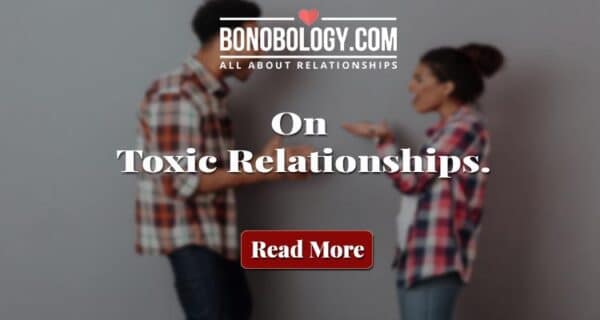More often than not, these relationships begin as fun and exciting, mimicking the components of a normal relationship. During this honeymoon phase, a couple develops enough happy memories, which they desperately clutch on to when toxicity begins to rear its ugly head. This, in turn, diminishes the scope of trying to make a relationship less toxic because rather than face the grim reality staring them in the face, people trapped in such relationships latch on to the ‘happy’ past as a denial mechanism. To be able to fix a toxic relationship, it is imperative to be mindful of the fact that people change. With this change, their relationships evolve too. Sometimes for the better, at others, for the worse. The only way to reverse toxic behavior is to acknowledge the problematic patterns as you see them emerge and proactively look for solutions.
What Are Some Common Cause And Signs Of A Toxic Relationship?
To be able to fix a toxic relationship, or at the very least make a relationship less toxic, you need to understand what it means to be in one. A toxic relationship is one that chips away from your self-esteem, eats into your happiness and contaminates the way you view yourself and the world. The reason why a relationship turns toxic can be varied. One of the most common triggers for toxicity is to be trapped in a relationship with a toxic partner. Someone who goes through life, leaving behind a trail of broken relationships, hearts and people. But this isn’t the sole factor for toxicity. It is equally common for a couple to turn toxic, owing to a long spell of unmet needs, unpleasant history, bad feelings, grudges and resentment toward one another. In such cases, the relationship typically starts healthy. But over time, the baggage of disappointment and dissatisfaction becomes so overbearing that it starts polluting the relationship and adversely impacting the people in it. Whether you want to fix a toxic relationship or fix yourself after a toxic relationship, being aware of the red flags is critical. The bottom line is that toxic behavior doesn’t mushroom in a vacuum. There are always underlying causes that become triggers for certain toxic tendencies and signs. And these can exist on a spectrum. To help you reverse toxic behavior, let’s first take a close look at some of the toxic behavior causes and the signs or patterns triggered by them:
How To Fix A Toxic Relationship And Heal Together?
If you identify with any of these underlying triggers and signs, it’s natural that you have been wondering how to fix a toxic relationship? More importantly, is it even possible to remove toxicity from a relationship and heal together? We spoke to life coach and counselor Joie Bose for tips to help with toxic marriage or relationship. “When does a relationship get toxic? When it begins to harm YOU! This happens when you give so much that you lose yourself and you do not become the priority. You begin to think of someone else as being more important than you. If you want it to change, then remember that your partner will not like it at first. For your partner is used to you being a doormat. But if you are committed to making small changes consistently, it will add up to big results eventually,” Joie says. To fix a toxic relationship, Joie recommends the old vase approach. She says, “You need to take care of yourself just like you would of an old dusty vase. Take the vase out of the corner: Bring yourself out of the corner and tell yourself that you have likes and needs that need to be fulfilled as well. Acknowledge that. Polish the vase: Pamper yourself. Get a makeover. A haircut. Look and feel good. Take up a hobby. Follow your passions. Even a small act like buying yourself a new pair of shoes can become a feel-good factor. The idea is to make yourself look amazing physically and feel the same way from within. You should be able to look in the mirror and say, ‘Wow!’ Flaunt the vase: Go outside and interact with people without your partner. Have a wonderful time without fear. This may seem easy but it is not. If you are in a toxic relationship getting here is tough. The only way to succeed is to stick to this routine, irrespective of what your partner has to say about your newfound take on life. Your partner will surely not make it easy. They will try to emotionally abuse and manipulate you. But remain strong. Ignore what the partner says. Encourage your partner to do the same, when they try to shame you or call you selfish or other names. If you can’t love yourself, you surely can’t love anyone else. Do this for 6 months and this will become a habit for you. Do it for 12 and this new you will become the usual you for your partner. Slowly but surely, the toxicity of your relationship will disappear.” Essentially, this approach is about re-learning to prioritize yourself to successfully reverse toxic behavior in your relationship. Here are 21 ways you can do that and heal together:
1. Assess whether you can fix a toxic relationship
Yes, it is possible to fix a toxic relationship and heal as a couple. But not all toxicity is created equal. It often manifests on a wide spectrum of varying degrees of intensity. While you may earnestly want to undo the damage in a relationship and heal as a couple, it’s important to assess whether it’s a realistic outcome. For instance, any relationship where toxicity results in abuse or violence is not worth salvaging. In fact, such relationships are beyond redemption. Similarly, if one of the partners is unwilling to do the inner work needed to tide over toxicity, there is no way you can make progress.
2. Take some time off
The answer to how to fix a toxic relationship often lies in distancing yourself from your partner for some time. Once you take a dispassionate view of whether or not you can fix what’s broken in your relationship and see hope for a future, take some time off from the relationship. During this period, follow the No Contact Rule religiously. This distance will allow you both to reconnect with and focus on your individual needs. Besides, this time apart can act as a line dividing your days of toxicity from the time you decided to remove toxicity from the relationship. Presenting you a chance to reset the relationship. Of course, this becomes more challenging if you’re seeking help with toxic marriage. In that case, one of the spouses can make an alternative living arrangement in the interim. Alternatively, you can decide to minimize contact during this ‘break’.
3. Focus on yourself
To reverse toxic behavior, you need to prioritize your needs, expectations and desires. As Joie suggests, follow the old vase approach to focus on yourself during this time apart in your relationship. When you do decide to reconnect, make a conscious effort to keep with these practices for a period of 6 months to a year, or until they become internalized as the ‘new normal’. This will prevent you from falling back into old, unhealthy patterns. The practice of putting yourself first is non-negotiable if you’re looking to fix yourself after a toxic relationship. To be able to do this without guilt, you need to look at it as an act of self-love and not selfishness.
4. Learn the ABCD of toxic behavior
A toxic relationship has its own ABCD – accusations, blame, criticism, demands. Any one or all of these elements can be rampant in a relationship where either one or both partners display toxic traits. To heal from such toxicity and undo the damage in a relationship, you and your partner must commit to ending this cycle. When you notice that you or your partner is gravitating toward any of these problematic patterns, don’t fail to draw attention to that fact. Doing this becomes a lot easier if both partners understand that they’re not pitted against each other but are fighting a problematic tendency together as a team.
5. Take responsibility to reverse toxic behavior
The adage that it takes two to tango fits the gambit of toxic relationships perfectly. Even if the toxicity has been triggered by the problematic behavior displayed by one partner, the other too inadvertently and swiftly gets sucked into it. It starts as a survival instinct to cope with all the blame-game, accusations, nasty fights and emotional manipulation. Before you even realize it, you’ve become a part of the problem. So, when you decide to fix a toxic relationship, introspection becomes essential. Take the time to assess your role in augmenting and escalating your relationship troubles. And own up to it in front of your partner. Encourage them to do the same.
6. Resist the urge to place blame
Since blame-shifting has been a part of your relationship dynamics for so long, the urge to absolve yourself of all responsibility by pinning the blame of your actions on your partner – or vice-versa – can be intense. Even when you’re trying to take responsibility for your action, you may find yourself slyly telling your partner how they’ve triggered these problematic behaviors. That must be avoided at all costs if you want to make any real progress in undoing toxic behavior patterns.
7. Use the ‘I’ language
One of the simplest ways to make a relationship less toxic is to use the ‘I’ language instead of ‘you’. Say your partner has done something to set you off. Instead of saying, ‘you always do this…’, try saying ‘I feel unsettled when you do…’. This will help you voice your concerns and opinions without making them sting or make your partner feel cornered. With that, you can improve your chances of eliciting a more positive response from them.
8. Make yourself be seen and heard
One of the defining traits of a toxic relationship is that the partner who is at the receiving end tends to walk on eggshells to avoid triggering the other. This tendency to bottle up your feelings, brush issues under the carpet and essentially make yourself invisible in the relationship can lead to resentment in the long run. Besides, your partner may not even be aware that their actions are making you feel this way. So, to remove toxicity from the relationship for good, you need to start asserting yourself. If your partner says or does something that feels like an affront or is hurtful, let them know so. Of course, without accusations or blame. Pay attention to whether doing so makes you feel anxious or scared. If so, there may be some unresolved issues at play that you must be addressed with the help of a professional such as a therapist or a counselor.
9. Don’t rake up old issues
When it comes to asserting yourself, focus on turning over a new leaf now. Don’t bring unresolved issues of the past into the picture. It will further aggravate the problems between you and your partner rather than help make a relationship less toxic. If there are some past issues that you’re just not able to let go of or feel that it’s not possible to make a fresh start without addressing them, doing so under the guidance and supervision of a trained professional is the right approach.
10. Consider couples therapy
If you want to fix a toxic relationship where unhealthy and dysfunctional tendencies have been building up for too long, couple therapy becomes a necessity more than an option. Often, couples are not able to spot the problematic patterns on their own. Much less break and replace them with healthy practices. In such situations, the guidance and intervention of an expert become pre-requisites to undo the damage in a relationship. Talk therapy can help couples undo the damage and heal together. Know that seeking help is not a sign of weakness or failure. On the contrary, it’s a hallmark of your commitment toward the relationship and the will to not quit on one another even the going gets rough.
11. Start reclaiming your space in the relationship
In a toxic relationship, one partner is often reduced to the ‘doormat’ status. The needs, desires and expectations of one partner begin to dominate the relationship. To accommodate them, the other becomes more and more invisible. Breaking this pattern is an important part of the ‘how to fix a toxic relationship’ puzzle. As Joie points out, this effort will be met with resistance from the partner who has become used to having their way. But you must persevere until you get a breakthrough. Don’t dial back on your efforts for the sake of preventing your partner from hurt and anguish. By doing so, you’ll only enable their unhealthy tendencies even more.
12. Be compassionate toward each other
The toxicity of one part inevitably begins to rub off on the other. Even if you’re the one who feels invisible, unheard, diminished, you may have developed some unhealthy tendencies as a means of resistance. Alternatively, if the toxicity is the outcome of problematic relationship dynamics, both partners develop some unhealthy tendencies as a defense mechanism. The best way to counter these and fix a toxic relationship is to take the route of compassion. Rather than go at each other, with guns of accusations and blames blazing, put yourself in the other’s shoes and try to understand where they are coming from. Perhaps, they’re stressed owing to work, financial problems or issues with other members of the family. While none of this should pass off as an excuse for unruly behavior, by understanding their trigger you will be better equipped to cut them some slack wherever appropriate.
13. Focus on love
A toxic relationship is so fraught with manipulation and emotional drama that the most crucial component of a romantic partnership – love – takes a backseat. When you’re working to remove toxicity from a relationship, guide your attention toward love. Instead of focusing on your problems, let all the reasons you love your partner dominate your headspace. These reasons may not come to you naturally at the onset. You may even find yourself wondering why you’re together or trying to fix a toxic relationship. In such situations, it helps to list down the reasons why you love your partner in a diary or notebook. When doing so, make sure that these reasons are current and not distant memories of the past.
14. Commit to honest, healthy communication
Communication problems and barriers are the breeding ground of toxicity. When you’re unable to tell each other exactly how you feel – no matter how big or small the issue at hand – a cycle of toxic behavior is set into motion. It may not feel like it in the moment. But if you reflect, you will be able to see clear as a day that it is the little things that added up and snowballed into seeming irreconcilable differences. That’s why to reverse toxic behavior, you must commit to honest, healthy communication patterns. However, communication must not be confused with interrogation in relationships.
15. Don’t shy away from uncomfortable conversations
There are no shortcuts to fix a toxic relationship. It is a long-drawn-out process rife with unsettling processes. One among them is the need to have the uncomfortable conversations that you and your partner may have been avoiding for far too long. Say your toxic tendencies are rooted in an incident of infidelity. Even though you have chosen to stay together, you haven’t reconciled with your partner the right way. Perhaps, you didn’t talk about it enough. Or couldn’t forgive them for their transgression. Maybe, you didn’t take the time to process your feelings before deciding whether to stay or leave. Now that you’re trying to make amends, you have to reopen those old wounds to give yourself a chance to heal. Once again, doing so with the help of a relationship counselor or therapist is the recommended course of action.
16. Learn to trust yourself again
A toxic partner often uses emotional manipulation techniques such as gaslighting to make the other question their sense of judgment. This is essentially a trick to tip the power dynamics in their favor. Whether you’re trying to fix yourself after a toxic relationship or the relationship itself, evaluate if you’ve become distrusting of your own thoughts and feelings. If that is the case, you need to do the work to rebuild that trust in yourself. Your truth, your experience, your feelings are not up for debate. When you learn to stand your ground, you will also help break your partner’s gaslighting patterns. That is progress.
17. Express criticism in a healthy way
Just because you want to make a relationship less toxic doesn’t mean that you and your partner have to be in agreement with each other all the time. If you don’t agree with something the other has said and done but don’t voice our opinion, you’re enabling toxic behavior. The key is to be able to put forth contradicting opinions or criticism in a healthy, constructive manner. The sandwich method – where you start with praise or positive statement, follow it up with the criticism you have to offer, and then, close with another positive statement – is one of the most reliable approaches for this.
18. Set healthy relationship boundaries
To remove toxicity from a relationship, both partners must commit to setting healthy boundaries in the relationship. This allows you to be able to see yourself as separate individuals rather than one entity. Often, personal space, independence and liberty are stifled in toxic relationships. Setting boundaries allows you to reclaim that personal space as well as your individuality. A sense of independence, be it on the emotional front or functional aspects of your life, can be a liberating aspect that frees you from toxic patterns of over-dependence and co-dependence.
19. Focus on other relationships in your life
The world of people caught in toxic relationships often shrivels up to just them. Be it due to insecurities, jealousy or fear, either one or both partners begin to lose touch with people in their innermost circle. Family, friends, coworkers – relationships outside the romantic partnership move to a fringe, slowly but surely. This sense of isolation can make you feel more and more trapped in your relationship. To become less toxic as a couple, you must revisit these old ties and work on strengthening them all over again. Make time to go out without your partner, socialize with your friends, spend time with your family, attend office events. These interactions give you a sense of contentment and happiness.
20. Don’t let conflicts slide
Even when you’re trying to remove toxicity from the relationship, some conflicts, disagreements and differences of opinion are bound to crop up. As they do in every relationship. But you must not let them slide for the fear that another fight or argument will undo the progress you’ve made so far. Remember that the toxicity you’re dealing with is a cumulative sum of all the little fights you didn’t have.
21. Embrace the changes forever
It is easy to change for the short-term. But unless you conscientiously commit to internalizing that change, the risk of falling back to your old habits and patterns always looms large. To be able to reverse toxic behavior for good, you don’t just need to replace unhealthy patterns with healthy ones but also maintain them for the long haul. It’s not easy to fix a toxic relationship but it’s not impossible either. As long as both partners are willing to acknowledge the problem and become equal partners in finding a solution, a lasting change is a very realistic goal.









